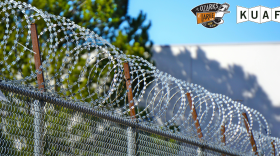A new report from the Walton Family Foundation measures the region's entrepreneurial climate. The study was led by Dr. Robert Fairlie, a UCLA-based economist, and examines the region's vitality for startups and for businesses five years old and younger.
The report finds startups account for just more than 30 percent of the region's businesses. That's a higher rate than the state and national averages, but lower than some peer metro areas like Austin and Provo.
Yee-Lin Lai, a senior program officer with the Walton Family Foundation, says the region's business ownership rate — the percentage of working-age people who own their own business — is 5.7%. That’s above the state average, but below the national number and again below the rate for many peer cities. However, she says the success rate for young firms — those established for less than five years — is better than most of the peer cities included in the study.
“I think it's encouraging that the young firm survival rate, we are doing pretty well. And I hope in part it's because of the work that all of us are doing at the entrepreneur support organizations to help provide technical assistance and the support that entrepreneurs need.”
The report shows more than 67% of businesses launched between 2016 and 2020 survived to 2021. Lai says there are signs that organizations designed to help entrepreneurs in northwest Arkansas are having a positive impact.
Access to capital is a major building block for new businesses anywhere, and Lai says the crowdfunding concept of Kiva Northwest Arkansas is an example of regional success.
“The unique thing about Kiva — we call Kiva a hyper-accessible loan — it's what I would refer to as the first rung of the capital ladder for entrepreneurs. It has no fees, no interest rates, no collateral-required loans. It’s a microloan up to $15,000 for anybody who wants to start a business. Those loans can help a new business that might not be able to obtain a loan from a bank. They may not want to approve a loan for you because you have no track record, you may not have a good credit score, you may not have the collateral required.
“So a Kiva loan is really leveraging the community to decide how to underwrite the loan. The hypothesis is that if you have a business idea, you put it on the Kiva platform, and if the community loves it, they will be a business patron of yours. And so the more likely you are able to repay that loan.
“The Walton Family Foundation supports the Kiva concept. We also do a match of 50%. If you are able to raise 50% of your loan target, we will match the other 50%.”
The new report, officially titled Entrepreneurial Climate in Northwest Arkansas: A Comparison Across Peer Regions, also measures something called the business ownership to unemployment rate. This allows for an understanding of how many startups in a region are opportunity startups — people wanting to start their own business — versus necessity startups, businesses begun because of a lack of other viable options such as unemployment or a stagnant job market.
Northwest Arkansas' business ownership to unemployment rate of 2.1 percent in 2023 is higher than the state and national averages and about in the middle of the aspirational peer cities used for comparison in the study.
Lai says it’s important to have a strong entrepreneurship climate because new businesses diversify a local economy, and diversification can make the economy more resilient to market shifts.
“I think it will ensure the long-term vitality of the region's economy if we have a more diversified economic base. We have big corporations, we have small companies, we have a diverse industry sector. The entrepreneur ecosystem is important. We want the next big corporation. They don't just start as big corporations — they start as a small company.”
She says a strong knowledge of the startup atmosphere can make entrepreneurship stronger as well.
“Capital is important, but it's not the only way to help new businesses. There is also a lot of technical assistance that can be helpful because you might have a great business idea, but there is no push, like no one to say, hey, that's a really great idea, to validate your idea and tell you what's next.
“So we support initiatives where the entrepreneur support organizations are, either through accelerators or one-on-one meetings, offering technical assistance to would-be or existing entrepreneurs — trying to validate their business concepts or helping connect them to potential customers. And I think this is supposed to help the entrepreneurs in scaling their business or getting started.”
The full entrepreneurship climate report for northwest Arkansas can be found at WaltonFamilyFoundation.org.
Ozarks at Large transcripts are created on a rush deadline. Copy editors utilize AI tools to review work. KUAF does not publish content created by AI. Please reach out to kuafinfo@uark.edu to report an issue. The audio version is the authoritative record of KUAF programming.








